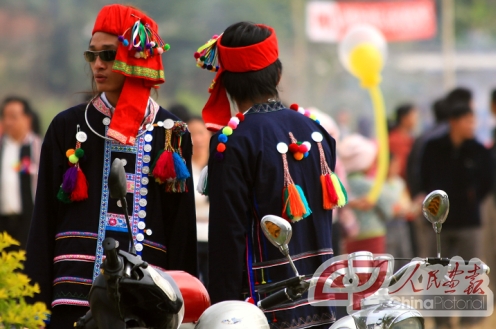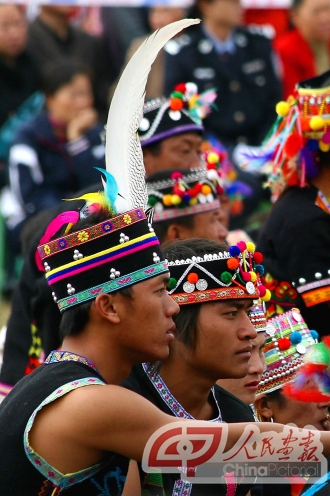Text and photographs by Lowell Bennett
|

|
| These gentlemen make you wonder if their particular ethnic group maintains their own security force. Either way, cool cats. |
Xishuangbanna (like, she-shuang-ban-naa), the more common designation for an area that includes the small city of Jinghong, southernmost Yunnan Province, on the border with Laos and Myanmar, is not the easiest place to get to. Whether flying, or (way less recommended) traveling by car or bus, Kunming is the transit point. A few carriers fly the 740-km hop, so after perhaps overnighting in Kunming, grab a mid-morning flight and about 90 minutes later you climb out of the taxi into a place like no other in China.
You sense it immediately. It's in the air – literally. No other town in this nation smells like it, in my experience. Wafting from the open-air restaurants, small cafes and food stalls is that distinctly commingled Southeast Asian blend of galangal root, curry, coriander, chili, cumin, lemon grass, turmeric, ginger, and what those spices go into – simmering dishes commonly encountered in places further south, like Chiang Rai, Luang Prabang, Bangkok and Hanoi. If your mouth waters just thinking about peppery som tom (spicy green papaya salad), satisfyingly-chewy pan-fried phad thai noodles, tangy coconut chicken soup and open-flame satay served with sweet chili and peanut sauce, along the streets of Jinghong you are always just a few steps away from complete gastronomic gratification.
And in the backcountry, too; eat your fill of homegrown foods offered up by accommodating villagers far from gas stoves and electric ovens. Banna is known for its diverse cuisine and for its world-class trekking. So after hiking tropically-inclined forested mountain trails, crossing flowered high-altitude plains, passing through cool green corridors of bamboo, you'll drop into a remote and hyper-bucolic village to dine and doze.
|

|
| Glamour Guys – During a gathering of Hani, Aini and Akha people, Banna backcountry. |